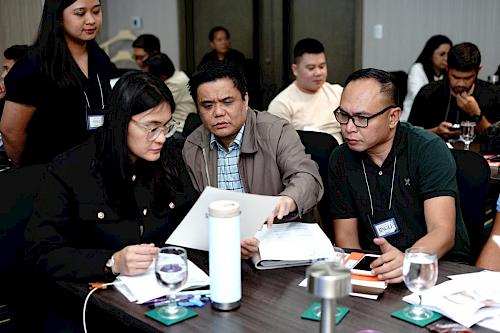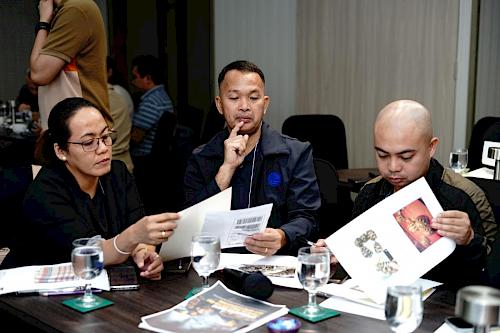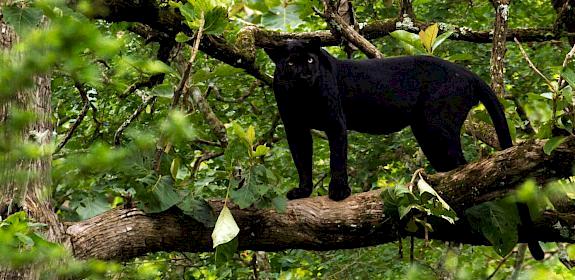Advancing Anti-Money Laundering Investigations and Prosecution for Wildlife Crime in the Philippines
For the first time, TRAFFIC partnered with Philippine anti-money laundering authorities and experts to hold training that helps law enforcers prosecute wildlife criminals with anti-money laundering charges – perhaps even as soon as in their next case.
 The Philippine Government assesses money laundering from environmental crime as high risk, due to the number of environmental cases, amount of criminal proceeds and absence of financial investigations.
The Philippine Government assesses money laundering from environmental crime as high risk, due to the number of environmental cases, amount of criminal proceeds and absence of financial investigations.
Over the years, while there are numerous environmental cases filed in Philippine courts – ranging from illegal mining, fishing, wildlife trade, and forestry law violations – there are no data that show money laundering investigations related to these environmental crimes have been conducted.
This makes skills acquired at the recent Financial Investigation Training session in Quezon City essential to the country’s efforts to improve interest, motivation, and capacity to investigate the financial-environmental crime nexus as well as prosecute those involved.
The training was jointly organised with the Philippines Anti-Money Laundering Council (AMLC), which is the country’s Financial Intelligence Unit, and the AML Research Centre Asia Pacific (ARCAP) Inc.
Building on ‘follow the money’ approaches, the training centred around providing practical skills and knowledge to government officials including law enforcement, prosecutors and legal officers, and representatives from the financial sector.
Participants discussed financial investigation techniques, talking about asset recovery, seizure, and confiscation, and presenting suspicious transaction reporting.
In response to the call for increased interest, motivation and capacity to investigate, arrest and prosecute perpetrators of these crimes, guidelines on implementing anti money laundering regulations and ‘follow the money’ principles to combat wildlife trafficking, will be developed.
“We can build stronger cases against traffickers by looking at wildlife crime through a financial investigations lens. We will be able to track the flow of money, identify key players, uncover money laundering schemes and gather better evidence,” said Ms. Jewel Padullon of the Department of Environment and Natural Resources Regional Office.
 Having 61% of the participants without prior financial investigation training, this was an opportunity for closer coordination and cooperation between AMLC, key Philippine Government agencies, and the private sector to improve the investigation and prosecution of wildlife criminals using financial investigation techniques.
Having 61% of the participants without prior financial investigation training, this was an opportunity for closer coordination and cooperation between AMLC, key Philippine Government agencies, and the private sector to improve the investigation and prosecution of wildlife criminals using financial investigation techniques.
“We welcome more opportunities like this training so the private sector can adapt our regulations around financial investigations. It allows us the chance to discuss new technologies and methods used by criminals and to be at the forefront, working with government in the effort to secure wildlife crime convictions.” said Atty. Ronald Pasamba, Legal Counsel of GCash which is one of the leading Financial Technology Companies in the Philippines.
The event gathered total of 47 government officials from the Department of Environment and Natural Resources (DENR) Biodiversity Management Bureau, DENR Environmental Law Enforcement and Protection Service, DENR Regional Offices, Bureau of Customs, National Bureau of Investigation, Philippine National Police – Maritime Group, Palawan Council for Sustainable Development Service, Anti Money Laundering Council Secretariat and the Department of Justice – National Prosecution Service.
Eight private sector representatives who participated came from Money Service Businesses namely the Philippine Association of Foreign Exchange Dealers, Money Changers and Remittance Agents, Inc. (PAFERA), PJ Lhuillier Inc., BEACON, EEC International Phil Corp. LBC Express and GCash.
Notes:
The Taking Charge: Strengthening Criminal Justice Response to Wildlife Crime in the Philippines is aimed at strengthening Philippine law enforcement agencies’ capacity to tackle wildlife crime and is funded by the United States Department of State Bureau of International Narcotics and Law Enforcement Affairs.
About Bureau of International Narcotics and Law Enforcement Affairs (INL):

Funded by the United States Department of State Bureau of International Narcotics and Law Enforcement Affairs. The opinions, finds and conclusions stated herein are those of the authors and do not necessarily reflect those of the United States Department of State.
The mission of INL is to minimise the impact of international crime, such as money laundering and criminal gangs, and illegal drugs on the United States, its citizens, and partner nations by providing practical foreign assistance and fostering global cooperation. Visit the Bureau of International Narcotics and Law Enforcement Affairs (INL)'s website.





